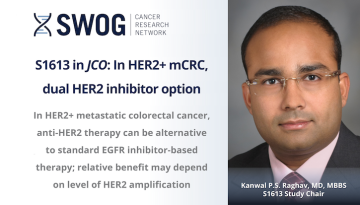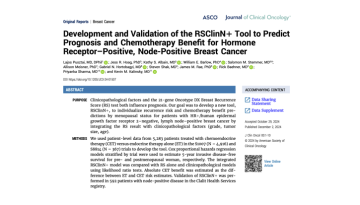Rare Angiosarcomas Respond to Immumotherapy
Researchers from SWOG Cancer Research Network, a cancer clinical trials group funded by the National Cancer Institute’s (NCI) Division of Cancer Diagnosis and Treatment (DCTD), part of the National Institutes of Health, have shown that the immunotherapy combination of ipilimumab and nivolumab shrinks rare angiosarcoma tumors in 25 percent of all patients, with some having an even stronger response to the drug combination.
Results of the SWOG study, led by Michael Wagner, MD, of the University of Washington, the Fred Hutchinson Cancer Research Center, and the Seattle Cancer Care Alliance, and conducted by the NCI National Clinical Trials Network (NCTN), were shared in a virtual oral presentation today at The Society for Immunotherapy of Cancer’s (SITC) 35th Anniversary Annual Meeting. The findings provide the first rigorous evidence that immunotherapies can treat angiosarcoma, a rare cancer of blood and lymph vessels that often develops in the skin. About 500 Americans are diagnosed with angiosarcoma each year.
Wagner’s study is part of a path-breaking clinical trial called DART, short for Dual Anti-CTLA-4 & Anti-PD-1 blockade in Rare Tumors. Launched in 2017 with sponsorship by the NCI, DART is proving a successful model for the study of rare cancers. Using an innovative “basket” design, DART tests the effectiveness of the ipilimumab and nivolumab combination in a variety of rare tumor types, thanks to a Cooperative Research and Development Agreement (CRADA) between the NCI and Bristol-Myers Squibb, the maker of both immunotherapy drugs. Through DART, the drug combination has completed testing in 36 cohorts of rare cancer patients, with another 12 cohorts still taking the drugs, and four cohorts temporarily closed for data analysis. Promising results have previously been reported in patients with other rare cancers, including neuroendocrine tumors and metaplastic breast cancer, while results from patients with thyroid tumors will also be reported at the 2020 SITC meeting.
An expert in sarcoma, Wagner wanted to replace anecdotal reports that immune checkpoint inhibitors like ipilimumab and nivolumab can successfully treat angiosarcoma with a prospective phase II trial. Wagner and his SWOG team enrolled 16 patients, all with advanced or inoperable cancer and all of whom were previously treated with chemotherapy. They found that 25 percent of patients saw their tumors shrink, regardless of where in the body their angiosarcoma occurred. The news was even better for patients whose cancer presented on the face or scalp. Those patients saw a 60 percent response rate to the drugs. In some cases, the response was long lasting. Two patients remain cancer free one year after treatment.
“These results open a new way to treat angiosarcoma – with immunotherapy,” Wagner said. “At SWOG, we’re planning a larger follow-up study to see if this combination can work as a first line of treatment.”
The SWOG team also found that most patients – 75 percent – experienced side effects from the drugs and 25 percent experienced severe side effects.
Rare cancers make up about a quarter of all cancers diagnosed worldwide. But because there are hundreds of types, and because each is so scarce, rare cancers are notoriously difficult to study. With expert advice from the NCI and the SWOG statistical team, the study leadership – Sandip Patel, MD, and Razelle Kurzrock, MD, both of UCSD Moores Cancer Center, and Young Kwang Chae, MD, of Northwestern University – came up with DART’s unique basket design. It’s proven successful. The study has successfully enrolled 755 with rare disease who may not otherwise have been eligible for a clinical trial. It also is plowing important ground in translational medicine. Tumor and blood specimens from DART patients will soon undergo DNA and RNA sequencing to shed light on their molecular makeup and how immunotherapies may help disarm certain rare cancer types. This work will be done through the Cancer Immune Monitoring and Analysis Centers (CIMACs), which were established by the NCI through its Cancer Moonshot initiative.
Wagner’s study was supported by the National Institutes of Health through National Cancer Institute awards CA180888, CA180819, and CA180868 and by Bristol-Myers Squibb.
Wagner’s study team includes Megan Othus, PhD, of the SWOG Statistics and Data Management Center at Fred Hutchinson Cancer Research Center; Sandip P. Patel, MD, of UCSD Moores Cancer Center; Christopher W. Ryan, MD, of Oregon Health & Science University; Ashish Sangal, MD, of Cancer Treatment Centers of America at Western Regional Medical Center; Benjamin Powers, MD, of the University of Kansas Cancer Center; George T. Budd, MD, of Cleveland Clinic; Adrienne I. Victor, MD, MS, of University of Rochester; Chung-Tsen Hsueh, MD, of Loma Linda University; Rashmi Chugh, MD, of University of Michigan Rogel Cancer Center; Suresh Nair, MD, of Lehigh Valley Cancer Institute; Kirsten M. Leu, MD, of Nebraska Methodist Hospital; Mark Agulnik, MD, of Northwestern University; Elad Sharon, MD, MPH, of the NCI’s Cancer Therapy Evaluation Program; Edward Mayerson, MS, of the SWOG Statistics and Data Management Center at Fred Hutchinson Cancer Research Center; Melissa Plets, MS, of the SWOG Statistics and Data Management Center at Fred Hutchinson Cancer Research Center; Charles D. Blanke, MD, of SWOG Cancer Research Network and Oregon Health & Science University; Howard Streicher, MD, of the NCI’s Cancer Therapy Evaluation Program; Young Kwang Chae, MD, MPH, MBA, of Northwestern University; and Razelle Kurzrock, MD, of UCSD Moores Cancer Center.
Other Recent Stories



